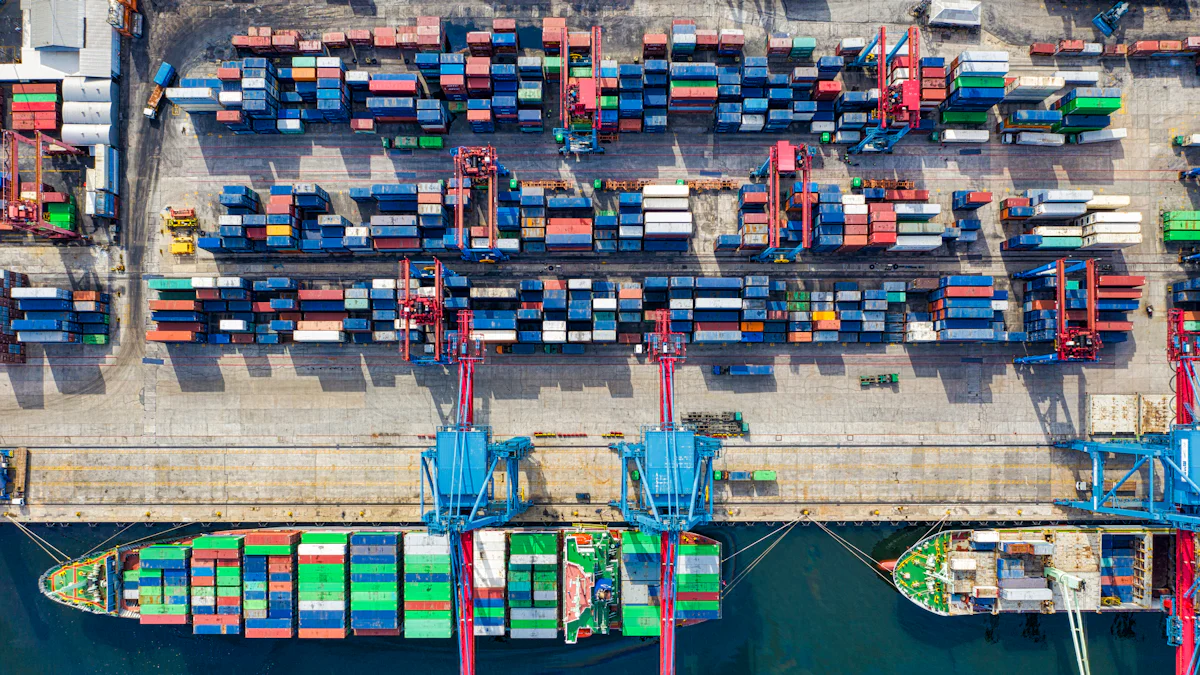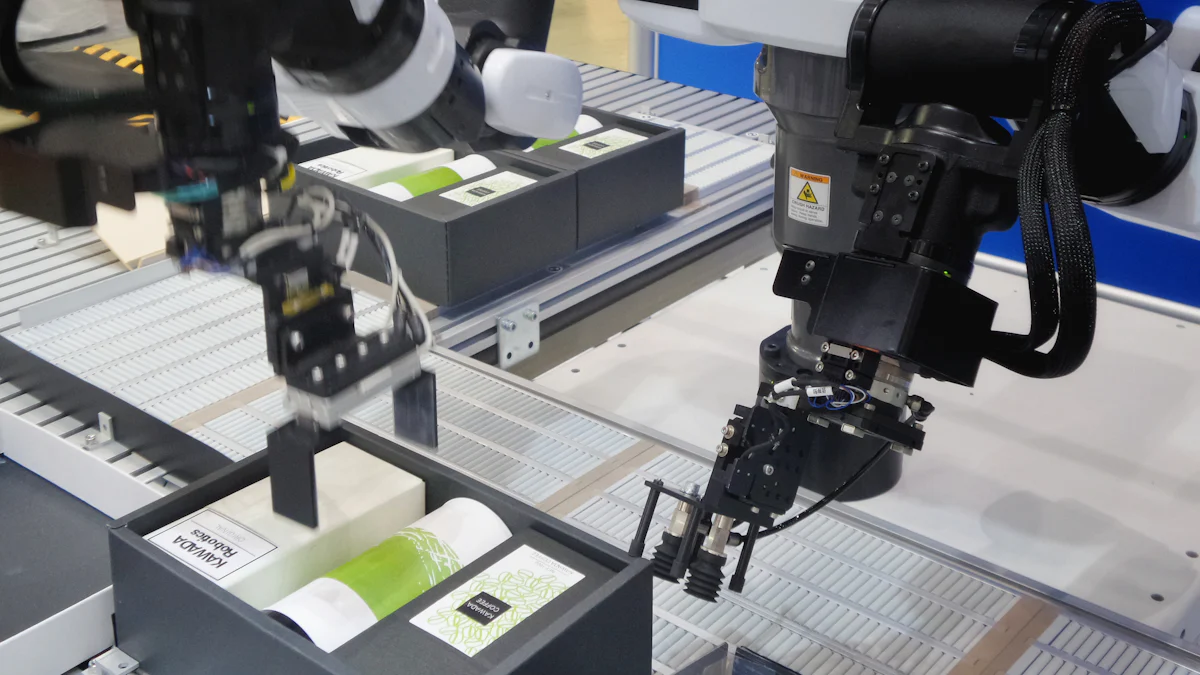The Future of Supply Chain Management with Technology

In the realm of supply chain management, the integration of technology supply chain has become paramount. The current landscape showcases a significant shift towards tech-driven solutions, enhancing operational efficiencies and fostering innovation. With key technologies like IoT, AI, and blockchain leading the transformation, businesses are poised to revolutionize their processes. This blog delves into the pivotal role of technology in modern supply chains, exploring its impact on streamlining operations, improving visibility, and driving sustainable practices for future success.
Technological Innovations in Supply Chain Management

In the realm of supply chain management, the integration of technology supply chain has become paramount. Let's delve into how these innovations are reshaping the landscape:
Internet of Things (IoT)
Real-time tracking and monitoring
The Internet of Things (IoT) revolutionizes supply chains by enabling real-time tracking and monitoring of goods throughout the entire logistics process. This technology allows companies to gain unprecedented visibility into their operations, ensuring timely deliveries and proactive issue resolution.
Enhanced inventory management
With IoT, inventory management reaches new heights of efficiency. Sensors embedded within storage facilities automatically monitor stock levels, triggering alerts for restocking when supplies run low. This proactive approach minimizes stockouts and optimizes inventory turnover rates.
Artificial Intelligence (AI) and Machine Learning (ML)
Predictive analytics for demand forecasting
Artificial Intelligence (AI) and Machine Learning (ML) empower businesses with predictive analytics capabilities that enhance demand forecasting accuracy. By analyzing historical data trends and market dynamics, AI-driven algorithms provide valuable insights for optimizing inventory levels and meeting customer demands effectively.
Automation of routine tasks
AI and ML technologies automate routine tasks in supply chain management, freeing up human resources for more strategic activities. From order processing to route optimization, automation streamlines operations, reduces errors, and boosts overall productivity.
Blockchain Technology
Transparency and traceability
Blockchain technology ensures transparency and traceability across the supply chain network. By creating an immutable ledger of transactions, stakeholders can track products from their origin to final destination, enhancing accountability and trust among partners.
Security and fraud prevention
Blockchain's decentralized nature strengthens security measures within supply chains by safeguarding sensitive data from cyber threats or fraudulent activities. The tamper-proof nature of blockchain enhances data integrity, mitigating risks associated with unauthorized access or data manipulation.
Robotics and Automation
Warehouse automation
In the realm of supply chain management, warehouse automation stands as a beacon of efficiency and precision. By implementing automated systems within warehouses, companies can optimize storage, retrieval, and distribution processes seamlessly. These technological advancements reduce human intervention, minimize errors, and enhance overall operational speed.
Autonomous vehicles and drones
The integration of autonomous vehicles and drones in supply chain operations marks a significant leap towards streamlined logistics. These innovative technologies offer swift and reliable transportation solutions for goods across various distances. Autonomous vehicles navigate routes with precision, ensuring timely deliveries while drones provide aerial support for efficient inventory management.
By embracing robotics and automation in supply chain management, businesses can elevate their operational capabilities to meet the evolving demands of modern commerce effectively.
Benefits of Technology in Supply Chain Management
Increased Efficiency
Streamlined operations
Implementing technology supply chain solutions leads to streamlined operations within businesses. By automating processes and enhancing visibility, companies can optimize their workflows for maximum efficiency.
Reduced lead times
One of the significant advantages of technology supply chain integration is the reduction in lead times for product delivery. Through real-time data analysis and predictive algorithms, organizations can expedite their supply chain processes effectively.
Cost Reduction
Lower operational costs
By leveraging technology supply chain tools, companies can significantly reduce their operational costs. Automation of routine tasks, such as inventory management and order processing, minimizes manual labor expenses and improves overall cost-efficiency.
Minimized waste and errors
The implementation of technology supply chain solutions plays a crucial role in minimizing waste and errors across the supply chain network. With enhanced accuracy in demand forecasting and inventory management, businesses can optimize resource allocation and reduce unnecessary expenditures.
Improved Customer Satisfaction
Faster delivery times
Utilizing technology supply chain innovations results in faster delivery times for customers. By optimizing transportation routes and enhancing logistics processes through automation, businesses can meet consumer demands promptly and improve overall satisfaction levels.
Enhanced product quality
Technology-driven advancements in supply chain management contribute to enhanced product quality standards. Through automated quality control measures and real-time monitoring systems, organizations can ensure that products meet high-quality benchmarks before reaching customers.
Challenges and Considerations
Implementation Costs
Initial Investment
Companies embarking on the integration of technology in supply chain management face significant initial investment costs. This includes acquiring the necessary hardware, software, and infrastructure to support advanced technological solutions.
Ongoing Maintenance and Upgrades
Following the initial setup, businesses must allocate resources for ongoing maintenance and upgrades of their technology systems. Regular updates are essential to ensure optimal performance and compatibility with evolving industry standards.
Data Security and Privacy
Protecting Sensitive Information
Safeguarding sensitive data within supply chains is a critical consideration. Implementing robust cybersecurity measures, encryption protocols, and access controls help prevent unauthorized access or data breaches that could compromise confidential information.
Compliance with Regulations
Adhering to data security regulations and privacy laws is imperative for companies leveraging technology in their supply chain operations. Ensuring compliance with industry standards and legal requirements safeguards both customer data and organizational integrity.
Workforce Adaptation
Training and Skill Development
As technology reshapes supply chain management practices, employees need adequate training to adapt to new systems and processes effectively. Investing in continuous skill development programs empowers staff to leverage technology for improved operational outcomes.
Managing Resistance to Change
Resistance to change is a common challenge when implementing new technologies in supply chains. Effective change management strategies, clear communication channels, and stakeholder involvement are essential in overcoming resistance and fostering a culture of innovation.
Future Trends and Predictions

Integration of Advanced Technologies
Synergy between AI, IoT, and blockchain
The integration of technology supply chain is propelling the synergy between Artificial Intelligence (AI), Internet of Things (IoT), and blockchain technologies. This convergence revolutionizes supply chain operations by enhancing data visibility, predictive analytics, and transaction transparency. Companies leveraging this harmonious blend of technologies are poised to unlock new levels of efficiency, resilience, and innovation in their supply chain networks.
Emergence of new technologies
As the landscape of supply chain management evolves, new technologies continue to emerge, offering novel solutions to age-old challenges. From augmented reality for warehouse optimization to 3D printing for on-demand manufacturing, these innovative tools redefine traditional processes and pave the way for a more agile and responsive supply chain ecosystem.
Sustainable Supply Chain Practices
Green logistics
Embracing sustainable practices in technology supply chain management is imperative for reducing environmental impact and fostering long-term sustainability. Green logistics initiatives focus on minimizing carbon emissions, optimizing transportation routes, and promoting eco-friendly packaging solutions. By prioritizing environmental stewardship, companies can align their operations with global sustainability goals while creating a greener future for generations to come.
Circular supply chains
The concept of circular supply chains is gaining traction as businesses seek to minimize waste and maximize resource efficiency. By implementing closed-loop systems that promote product reuse, recycling, and remanufacturing, companies can reduce their ecological footprint while driving economic value. Circular supply chains not only contribute to environmental conservation but also enhance operational resilience through a more sustainable approach to production and consumption.
Globalization and Localization
Balancing global reach with local responsiveness
In an interconnected world driven by technology supply chain advancements, striking a balance between global expansion and local responsiveness is crucial for sustained growth. Companies must navigate the complexities of international markets while remaining attuned to regional preferences, regulations, and cultural nuances. By tailoring strategies to meet both global demands and local expectations, organizations can foster customer loyalty, mitigate risks associated with geopolitical shifts, and capitalize on diverse market opportunities.
Impact of geopolitical factors
The interplay between technology-driven supply chains and geopolitical factors introduces a layer of complexity that influences business decisions on a global scale. From trade policies to geopolitical tensions shaping international relations, companies must adapt their supply chain strategies to mitigate risks associated with geopolitical uncertainties. By staying informed about geopolitical developments and maintaining agility in response mechanisms, businesses can safeguard their operations against potential disruptions while capitalizing on emerging opportunities in dynamic markets.
Reflecting on the discussed points reveals a clear trajectory towards technological advancement in supply chain management. The transformative power of technology is reshaping operational landscapes, enhancing efficiency, and fostering innovation. Businesses must prepare for this inevitable shift by embracing cutting-edge solutions to stay competitive in dynamic markets. It's crucial for companies to proactively invest in technology and leverage its potential to optimize supply chain processes, meet evolving customer demands, and drive sustainable practices for a prosperous future.
See Also
Twinning the Future: Supply Chain Management Revolution
Steering Through Transformation: Tech-Infused Supply Chain Solutions
Artificial Intelligence in Logistics: Tomorrow's Revolution
Paving the Way: Logistics Future Through Digital Innovation
Revealing the Future: Insights on AI-Integrated Supply Chain
